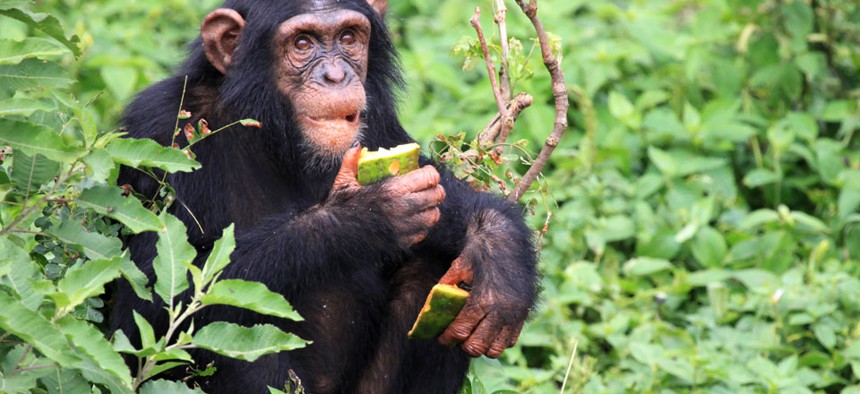
Sam DCruz/Shutterstock.com
Chimps Endure Congressional Monkey Business
NIH expects to hit spending limit for retired chimps by mid-November.
If Congress doesn’t act soon, humans won’t be the only primates frustrated with the political process -- chimpanzees will take a hit, too.
Specifically, research chimps owned by the National Institutes of Health. The federal government has decided it won’t use the animals for research anymore and has plans to retire most of them. The problem? NIH is prevented by a 2000 law from spending more than $30 million over time on the care of our fuzzy relatives living in reserve sanctuaries. The agency expects to hit that limit by mid-November.
It’s a chimp cliff, if you will.
“If we do not get the necessary changes to the law it will be very grim indeed,” says Kathy Hudson, NIH deputy director of science, outreach and policy. “We certainly don’t want to be in a position where we’re in violation of the law, but we also don’t want to be in position where these animals are not fed and cared for.”
NIH owns and helps pay for the care of 670 chimpanzees, as of October 2012. The agency had anticipated sending about 60 to the Chimp Haven sanctuary (which is sort of like Florida for chimps). More than 100 are already in the reserve, each costing about $43 a day to care for. The federal government provides 75 percent of the money required to take care of the chimps, while Chimp Haven pays the remaining 25 percent.
A bill before the Senate Health, Education, Labor, and Pensions Committee on Wednesday would give Health and Human Services Secretary Kathleen Sebelius greater flexibility in how to spend money NIH already has for the retired chimps in the reserves. It’s sponsored by Committee Chairman Tom Harkin, D-Iowa, and ranking member Lamar Alexander, R-Tenn.
And if it doesn’t pass? The current law leaves few options. NIH can’t send the chimps in sanctuaries back to research labs, where they are more expensive to care for but where the agency is allowed to spend money on them. Euthanasia is prohibited unless it’s in the “best interest” of the animal.
Chimp advocates don’t think it will ever come to that. Marcia Kramer, director of legislative programs for the National Anti-Vivisection Society, says private donors and volunteers will likely step up in the short term to help care for the animals if money runs out. “It’s morally unacceptable to the people involved that they would just be euthanized,” Kramer says.
Given its bipartisan support, time is the bill’s biggest enemy. It could pass the Senate under unanimous consent. “This is the time when we really, really, really need Congress to work together, and it’s an issue where there are no opponents, so this should be really easy,” Hudson said.
If recent history is any indication, even the easy stuff is hard to get through a jammed congressional calendar. And as for whether chimps are already fed up with Congress, none could be reached for comment.
(Image via Sam DCruz/Shutterstock.com)







